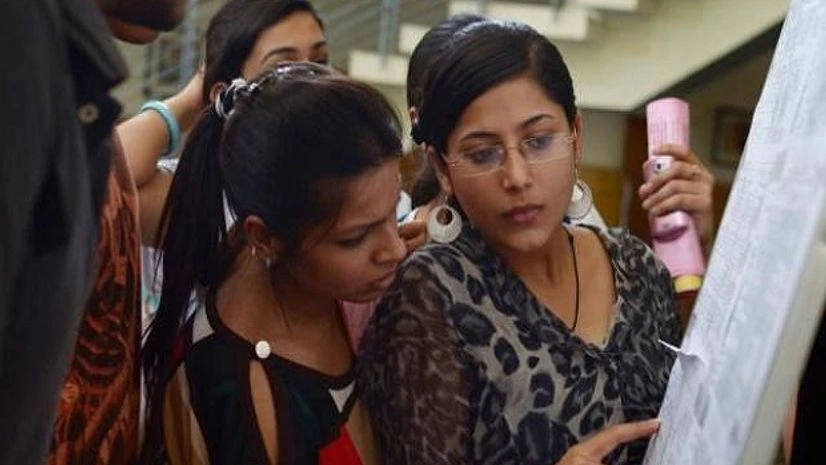Delhi University (DU) is contemplating overhauling its admission procedure of more than 75 colleges by holding a single entrance exam, The Economic Times reported on Wednesday.
DU, currently accepts students, who have scored higher than a cut-off percentage mark it sets. The move to change this system comes in the wake of reports that multiple school-leaving examination boards are inflating marks, making it harder with each passing year for even high-scoring students to get into colleges in the national capital.
Vice-chancellor Yogesh Tyagi said to The Economic Times that such a proposal is under consideration and will be examined in detail as soon as this year’s admission process is concluded, adding that similar suggestions had been made earlier.
"Now with reports of board marks being inflated to ease admissions, we are closely looking at solutions. While this has been discussed a little at various places, it requires a more structured discussion. We plan inclusive discussions on this to see how to conduct it, how many examination centres may be needed and where to set up centres and other logistics," Tyagi was quoted as saying to The Economic Times.
While inflation of marks is a concern, it is not the only issue. Tyagi said the scale of such an exam would entail considerable work because over 3 lakh students from all over the country apply for admission to DU every year.
Apparently, the proposal has been discussed at the Ministry of Human Resource Development. The ministry officials said that all Central universities are autonomous and can set their own admission policy.
More From This Section
In 2015, the university's cut-offs even crossed 100 per cent for some courses. A ‘penalty’ was imposed on students who change their streams, meaning they had to show 100 per cent-plus scores, said a Hindustan Times report. At Lady Shri Ram (LSR), applicants needed to have an aggregate score of 100.5 per cent to bag a seat in the Psychology (Hons) programme.
According to the fifth cut-off list announced on Tuesday night for admissions this year, getting into the Shri Ram College of Commerce (SRCC) to study Economics (Hons) still requires 97.25 per cent.
The skyrocketing cut-offs at DU have attracted widespread criticism. Recently, Delhi Chief Minister Arvind Kejriwal termed the admission process as 'most bizarre' and demanded an admission quota for Delhi students.
In a letter written to Smriti Irani (former HRD minister) on July 2, Manish Sisodia, Delhi's deputy chief minister, had suggested allotment of 5 per cent additional marks for local students in those DU colleges, which are funded completely by the Delhi government.
According to an NDTV report last year, the Delhi High Court sought the responses of DU and Kerala government on a plea claiming that each college in the capital had different criteria for calculating cut-off marks of students from other state boards during the admission process seeking their replies on a plea by a student from the southern state who sought a uniform system of admission to be followed.
Under the CBSE pattern of exams, there is 70:30 ratio of theory and practical, while in Kerala State Education Board, "The evaluation system is that 20 per cent will be given for internal assessment, 20 per cent for practical and 60 per cent for theory/written exam," the petition had said.
"Thus even if a student has obtained 100 per cent marks, he will be evaluated only on the 60 per cent written exam, excluding marks obtained by the student in practical test, which is an integral part of the exams as subjects like Physics, Chemistry and Biology cannot and should not be evaluated without the practical.
It also said: "There is no uniform system of admission in DU and there is a lot of confusion and misunderstanding with regard to calculation of cut-off marks, especially regarding students from other state boards."
The Economic Times further reported that students from Tamil Nadu alone secured as many as 80 per cent of the seats in a prestigious college in DU, which had set cut-offs of 98 per cent for two undergraduate courses.

)
